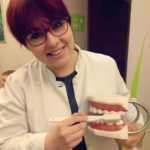
Permanent Solution for Missing Teeth
Dental implants are today one of the most popular and accessible solutions for tooth decay. What are dental implants, who are the candidates for its installation and many more stuff read down below.
What are dental implants?
The dental implant is a screw made of titanium that is embedded into the bone by a simple and completely painless procedure. By installing dental implants, you can permanently solve the problem of missing teeth, whether it is a lack of a tooth, a tooth or a completely jawbone. Dental implants are a permanent fixed solution – meaning that once they are installed they can no longer be pulled out, but mobile and fixed prosthetic substitutes can also be used.
What is the purpose of dental implants?
The purpose of dental implants is to mimic the natural tooth. Its basic function is to return all oral functions after its installation and completion of treatment (complete prosthetic replacement).
Who can embed dental implants?
Dental implants can incorporate any healthy person who is prepared to adhere to adequate oral hygiene. Also, older people, cardiac patients or people with certain systemic diseases (diabetes) can also incorporate dental implants. In any case, individual consultation, preparation and review is required at the chosen dental team.
Dental implants are implanted surgically, i.e. by surgical drilling in the bone. Though the name “surgical procedure” provokes fear and discomfort, it is a minimally invasive, time-consuming, most commonly occurring procedure in local anesthesia in the clinic / hall. If the implants work with bone augmentation, sinus lift etc., the procedure is more invasive and longer.
How to maintain oral hygiene after implantation?
Implants are maintained just like the real teeth and for this reason is very important oral hygiene and proper maintenance! No additional oral hygiene equipment, except toothbrush, toothpaste, interdental toothbrush and toothpaste, should be noted – EVERYDAY.
When is it not advisable to embed dental implants?
To our decision to install dental implants, we need to be aware that our body, which has a highly developed and well-defended defense system, finds it easy to find elements and bodies that are not the natural composition of our body and automatically protects us from them. This is, of course, our immune system. There are therefore people who simply “deny” dental implants after installation.
Also, dental implants are very resistant, but poor living habits will increase the chances of the body rejecting the embedded implant. Increased risk for people who consume tobacco products because they slow down the process of healing, excessive alcohol consumption, which also affects mucus healing, periodontal disease, impaired immunity – autoimmune diseases, patients exposed to radiation, steroids and the like, people with bruxism ( squeezing and throwing teeth and those still in development (children under the age of 18).
What to add to the end?
As more than 1700 implants come into the market today, it is very important for patients to know exactly which implant are embedded, because there are big differences between them – both in price and in the quality and materials they made.
Implants can be divided into three groups – Premium, Medium and Low Cost Implants, i.e. implants at a very low price. As everything in life is tailored to our capabilities and needs – it is the same when choosing implants. After installing dental implants you should get a booklet with the name, mark and size of implanted implants. Install dental implants in safe and verified locations, take care of yourself and your health.

Author: Iva Tomić, Dental hygienist view



I give consent to Be Seen Be Popular (BSBP) to process and use my personal information ( name and e-mail address ) in order to answer to my inquiry and send information associated with this website.